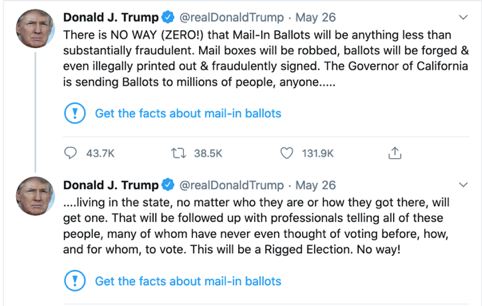Big Tech Should be Part of the Commons

The President’s threats on shutting down Twitter for fact checking his tweets on mail-in ballots seem to be a bit of an overreach, if one were to elevate it beyond the status of theatrics. Trump, the epitome of neo-liberal mumbo-jumbo, owes his current status as “leader of the free world” largely to social media. So one would caution that his threats about shutting down tech platforms be taken with dollops of salt. Even if an unhinged president did seriously think of it, with no law to back his actions, what would his re-election prospects be without the aid of social media anyway?

While Trump’s threat sounds hollow at more levels than one, there is a serious case for making social media platforms and big tech part of the commons. What is obvious is that Big Tech has imperiled the right of people to their privacy, to seek information from all sources and news of their choosing and question those in authority.
Facebook, according to a report in the Wall Street Journal, was in the know, as a result of internal research that the platform’s “algorithms exploit the human brain’s attraction to divisiveness,” enabling polarisation and tribal behaviour. The Journal’s report goes on to show how the company ignored the findings of the research, its approach being voiced by Mark Zuckerberg, the supremo, when he said that he would be “against those who say that new types of communities forming on social media are dividing us.” This flies in the face of a Tech Transparency Project finding last week that there were 113 white supremacist groups thriving on Facebook. A similar project in India could throw up no fewer right wing groups.
While rightwing groups have enjoyed the benefits of Facebook’s desire not to be “paternalistic”, the platform has been found more than eager to silence Left voices over the years, including attempts to de-platform pages like Venezuelanalysis and Telesur English. The full extent of its anti-left bias becomes evident with its partnering with the Atlantic Council in 2018 ostensibly to combat fake news. The Council boasts of directors like Condoleezza Rice, Colin Powell, Henry Kissinger and James Baker and other neocon biggies, according to a report in FAIR by Alan Macleod.
Reliance Industries Chairman Mukesh Ambani, while launching his flagship Jio network, said with rather little ingenuity, “data is the new oil”. These attempts at aphorisms about data hides the fact that what’s being peddled here is not some natural resource but the personal data of you and I. Thus are born experts whose job it is to make such gross transgressions sound blasé, everyday. David Roe, writing in CMS Wire, declares that “data is big business for tech companies that service the marketing companies that have been buying data for a competitive edge. While we may not like the idea that our personal data is harvested in the first place, theoretically by accepting the terms and conditions on most websites we visit, we accept that at least some of our personal data will be used.”
While Facebook does harvest enormous data, which extends beyond a user’s activities on its platform to users browsing habits across the web, Google’s “full spectrum” set of products has the entire publishing value chain firmly ensconced in its formidable grip. From it’s popular mail service and the top two search engines in the world, to its suite of tools for publishers, which includes a traffic analysis platform, Google pretty much knows what’s going on in our lives as well as what it wants us to know about the world.
The arrival of mobile devices has dramatically transformed the data available to Apple, Google, Facebook and Amazon. And with all strictures in place, the opacity of technology ensures that such recalcitrances occur at regular intervals: Arizona recently sued Google over allegations that it illegally tracked Android smartphone users’ locations.
Attempts like the European Union’s General Data Protection Regulation or the recent attempts by chairman Rod Sims of the Australian Competition and Consumer Commission, and the French regulator Isabelle de Silva to rein-in big tech might not be adequate. Because one cannot underestimate the extent of Big Tech reach in Washington DC.
So it should come as no surprise when in the garb of combating fake news many progressive sites took quite a beating in 2017. According to Alan Macleod, “AlterNet’s Google traffic fell by 63 percent, Media Matters by 42 percent, TruthOut by 25 percent and The Intercept by 19 percent.” While the algorithm of its search engines, the ever-changing secret recipe to be on top of search engine rankings and its ability to gauge the traffic to pretty much any website in the world is a matter of serious worry, in the past three years the attempt to stifle traffic to left and progressive sites must only have exacerbated, with better algorithms, artificial intelligence and search engine optimisation techniques.
Geert Lovink in his book SAD Design, said “Muck gets raked, data gets leaked, and whistles get blown—yet nothing changes.” It is imperative that if we seek a common playing field and an open information system that fulfills the promise of the Internet as it was envisaged, Big Tech has to be downsized and platforms made part of the commons.
Get the latest reports & analysis with people's perspective on Protests, movements & deep analytical videos, discussions of the current affairs in your Telegram app. Subscribe to NewsClick's Telegram channel & get Real-Time updates on stories, as they get published on our website.
























